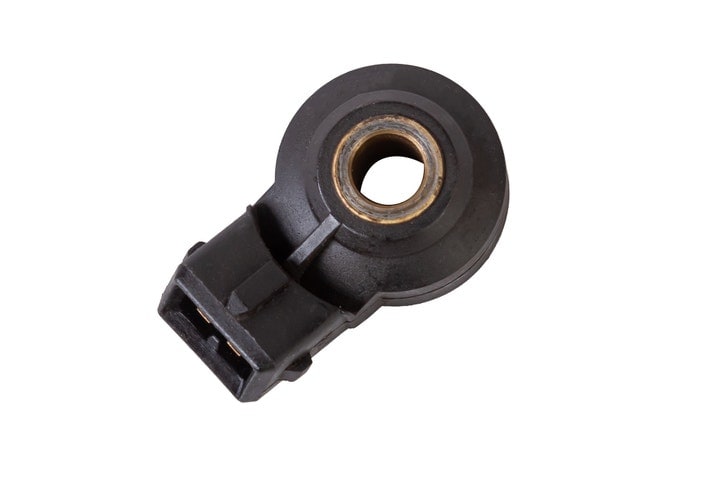Photo by Aleksandr Kondratov | iStock
Engine knock is a repetitive knocking or pinging sound you can hear under the hood as you accelerate or hold speed on the road. It's essentially caused by two things: fuel burning unevenly or pieces of metal banging together when they shouldn't. This is a serious problem, and your engine might be on the verge of seizing up if you routinely hear engine knocks. Fortunately, most cars today have engine knock sensors that alert you to the issue before things become serious.
Definition of a knock sensor
Knock sensors are designed to pick up abnormal vibrations or sounds in the engine block. These knocks happen when the air-fuel mixture in the cylinder burns unevenly and causes sudden pressure spikes that can lead to engine damage. The knock sensor helps the engine control module make adjustments to the ignition timing to prevent damage and maintain optimal engine performance.
The knock sensor feeds information to the engine control module (ECM) to adjust the ignition timing to avoid off-time cylinder combustion. This adjustment helps improve fuel efficiency, reduce emissions, and keep the engine running smoothly. Without the sensor, the ECM can drift out of alignment and let the cylinders burn at uneven rates, which creates shockwaves inside the engine block and may cause all kinds of damage to engine components.
Function of a knock sensor
The primary function of a knock sensor is to detect engine knocks. The knock sensor is usually mounted on the engine block or the cylinder head, where it can most easily pick up the vibrations caused by engine knocks.
Once the knock sensor detects abnormal vibrations, it converts these vibrations into electrical signals to the ECM. The ECM analyzes the data to determine if knocking is going on. If it is, the ECM adjusts the ignition timing by firing the spark plugs at a different rate to limit the cause of the knocking and protect the engine from potential damage. This real-time adjustment also helps optimize engine performance and even fuel efficiency by burning the fuel-air mix in the cylinders.
Components of a knock sensor
Piezoelectric crystal
The piezoelectric effect was a Nobel Prize-winning discovery for Albert Einstein, and modern knock sensors depend on it to pick up on engine knocks. This works because crystals emit small electric pulses when they're squeezed, so knock sensors have crystals inside them that get squeezed when they're hit by a shockwave from an engine knock. That squeezing generates an electrical pulse that goes down a wire to the ECM. The ECM interprets these pulses and makes the necessary adjustments.
Resonant frequency
The sensor is tuned to be especially sensitive to a specific frequency. That means it emits the strongest pulses at the exact frequency where knocks are happening. This helps separate engine knocks from the normal sounds and vibrations in a running engine.
Signs of a faulty knock sensor
Engine knocks
One of the most obvious signs of a faulty knock sensor is the presence of engine knocks. If the knock sensor fails to detect knocks, the ECM won't be able to adjust the ignition timing properly, which leads to increased knocking. Ignition timing issues can cause a noticeable knocking sound during acceleration, which indicates that the engine is experiencing preignition or detonation.
Check engine light
A malfunctioning knock sensor can also trigger the check engine light. When the ECM detects that the knock sensor is not functioning correctly or is providing inconsistent signals, it will store trouble codes and light up the check engine light to alert you to a potential issue.
Poor fuel economy
If your knock sensor is acting up, you might also notice your fuel economy is coming up short. A knocking engine might be inefficiently burning fuel, which wastes gasoline by pushing it out through the tailpipe unburned.
Effects of a faulty knock sensor
Ignition timing issues
A faulty knock sensor can lead to significant ignition timing issues. When the sensor fails to detect knocks accurately, the ECM can't adjust the ignition timing correctly. This misalignment can result in poor engine performance, increased emissions, and potential engine damage over time.
Engine damage
Persistent knocking can eventually cause severe engine damage. The repeated pressure spikes from knocking can harm the engine block, cylinder head and several other internal components. If this doesn't get fixed, the damage can lead to costly repairs and even irreparable engine failure.
Keep an eye on your knock sensor
The knock sensor is an important component of a modern engine that ensures optimal performance and longevity of engine parts by picking up engine knocks and telling the ECM to adjust the ignition timing. Using a piezoelectric crystal that's tuned to the engine's resonant frequency, it converts vibrations into electrical signals. Recognizing the signs of a faulty knock sensor, such as engine knocks, a check engine light and poor fuel economy, can help prevent ignition timing issues and potentially save you from serious engine damage. Regular maintenance and timely replacement of a malfunctioning knock sensor help protect the engine and maintain the vehicle's performance. If you suspect a problem with your knock sensor, consult a mechanic to diagnose and resolve the issue as soon as you can.


 by
by  edited by
edited by 
